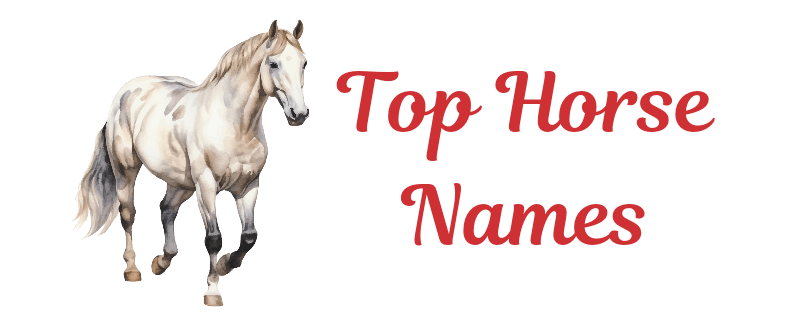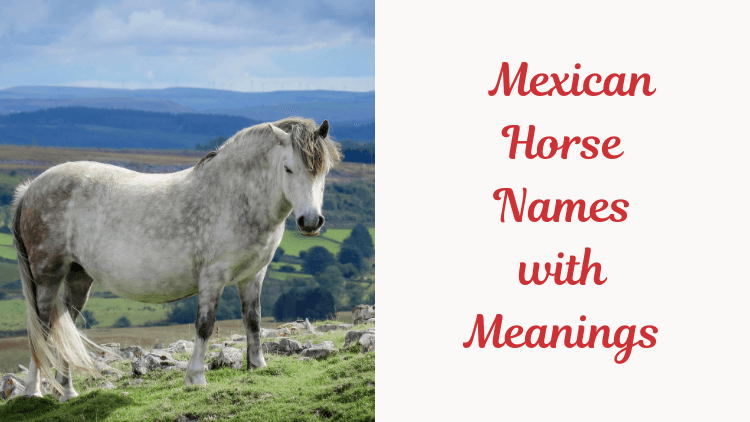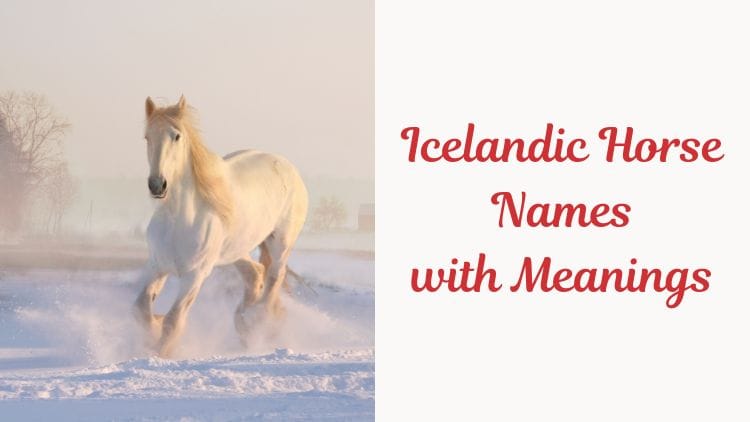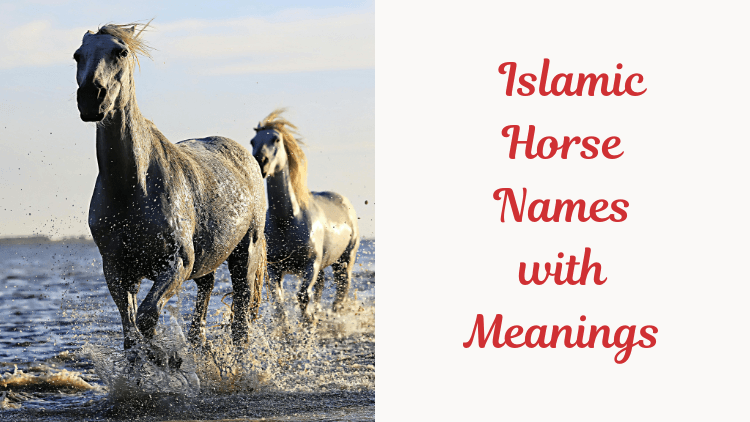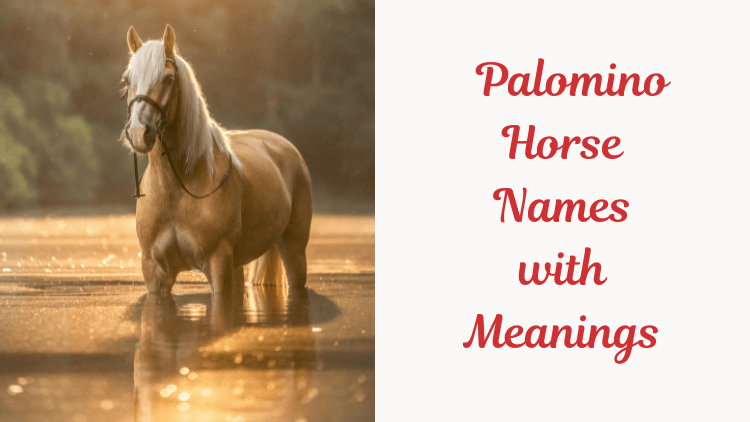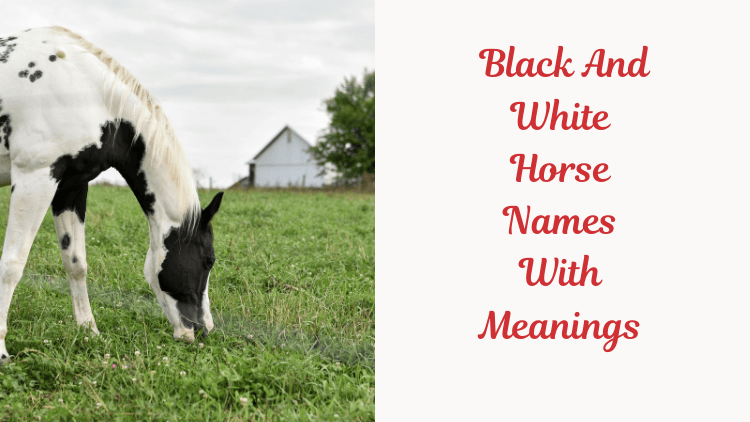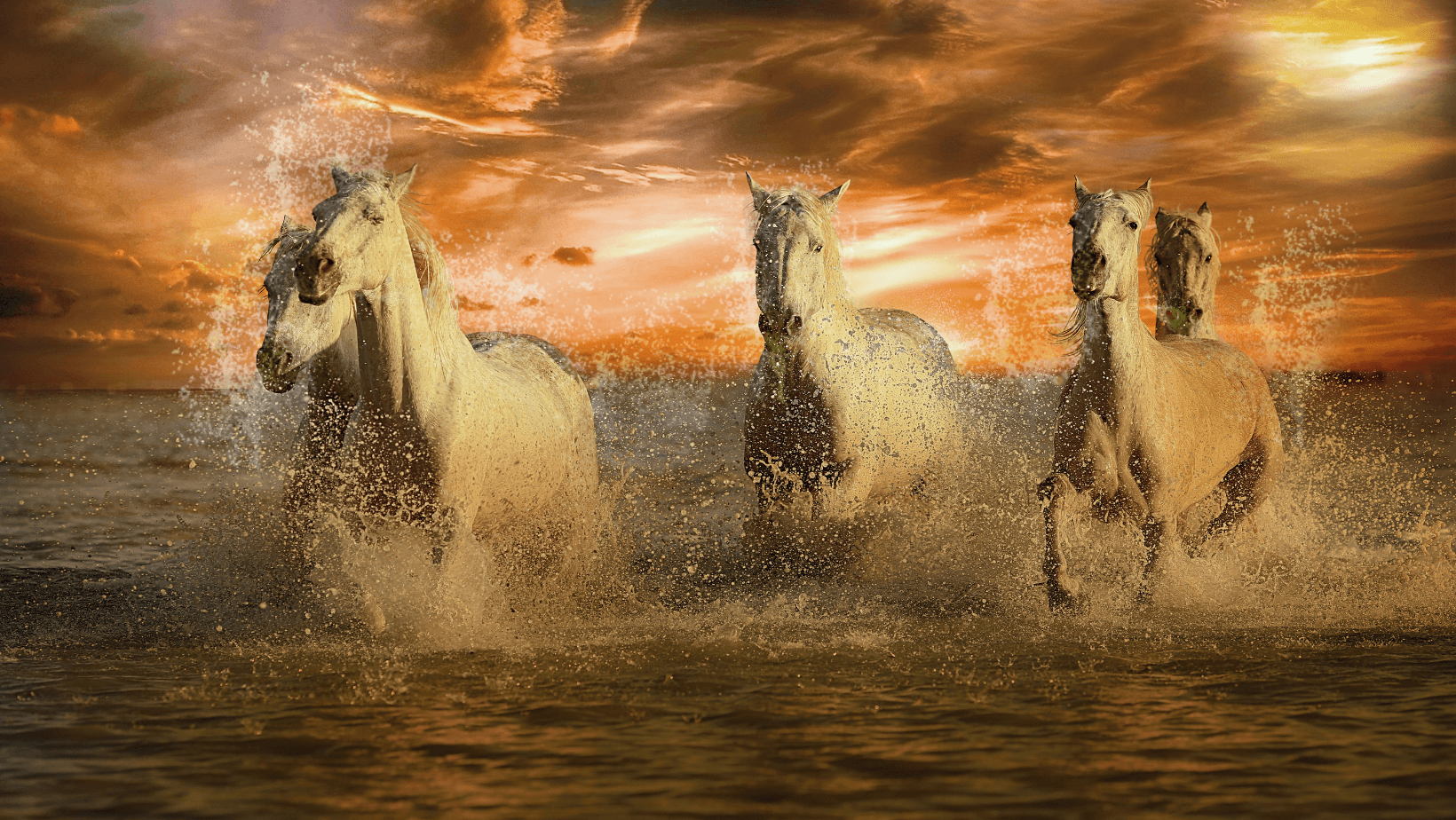180+ Unique Spotted Horse Names With Meanings: White, Black & Brown Horses
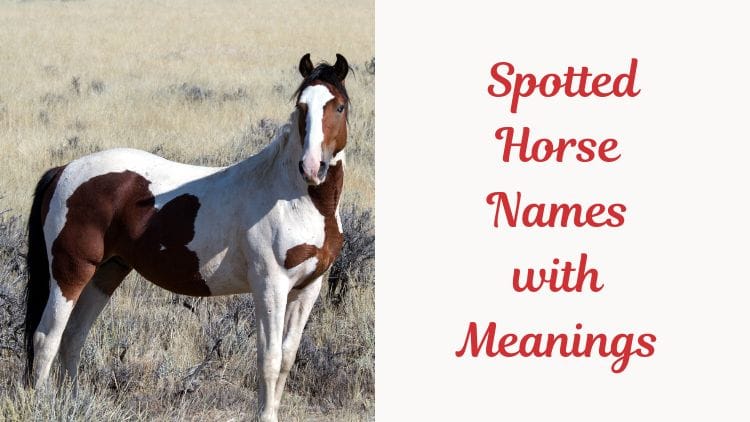
Spotted horses are a stunning sight, their distinctive patterns making them stand out in any herd.
These horses, with their unique coats of white, black, and brown spots, symbolize individuality and charm. Their eye-catching appearance often inspires names that reflect their beauty, personality, or connection to nature.
Naming a spotted horse is a special opportunity to celebrate their uniqueness. Whether you’re drawn to names inspired by their patterns, colors, or cultural significance, the right name can capture their spirit and make a lasting impression.
In this blog post, we’ll share a variety of unique spotted horse names, complete with meanings. From names suited for white-spotted, black-spotted, or brown-spotted horses, you’ll find the perfect fit for your equine companion.
Our 10 Best Name Suggestions for Spotted Horses
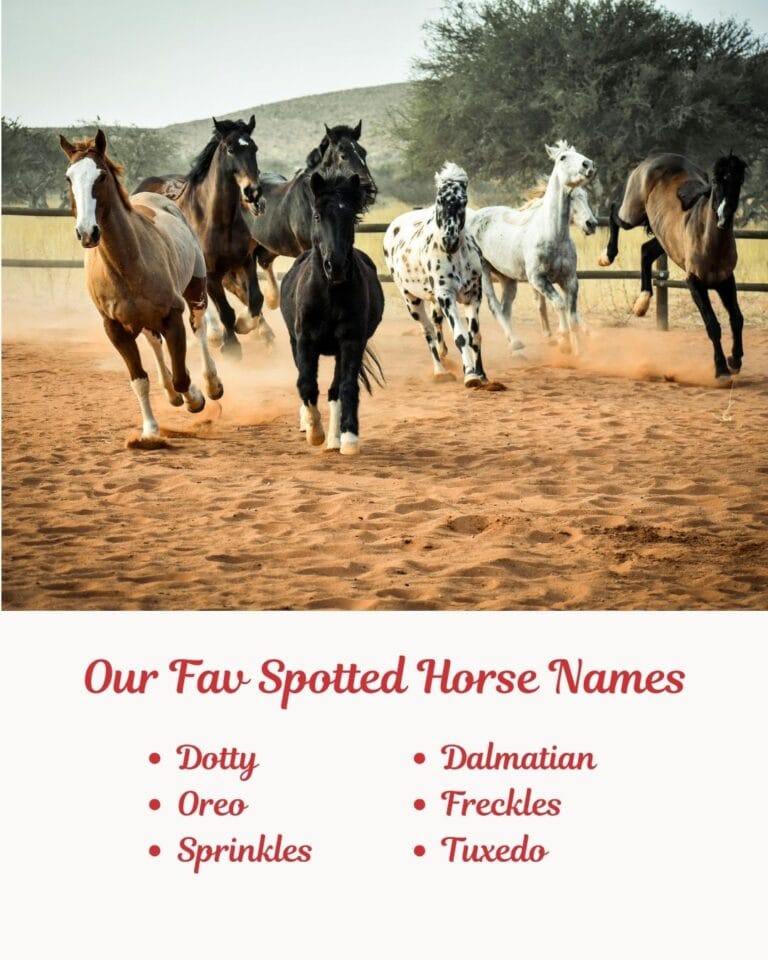
1. Dotty: A playful name for horses with small, scattered spots.
2. Freckles: Perfect for a horse with light, speckled spots on its coat.
3. Oreo: A fun name for black-and-white spotted horses, inspired by the cookie.
4. Patches: Ideal for horses with irregular or patch-like spots.
5. Sprinkles: A sweet name for a horse with many small, scattered spots.
6. Dalmatian: Named after the iconic dog breed, great for horses with similar spots.
7. Smudge: A quirky name for horses with irregular, smeared spots.
8. Tuxedo: A refined name for black-and-white spotted horses, resembling a tuxedo.
9. Domino: Perfect for horses with dramatic black-and-white contrast, like domino tiles.
10. Bandit: A mischievous name for a horse with bold, striking spots.
50 Black Spotted Horse Names
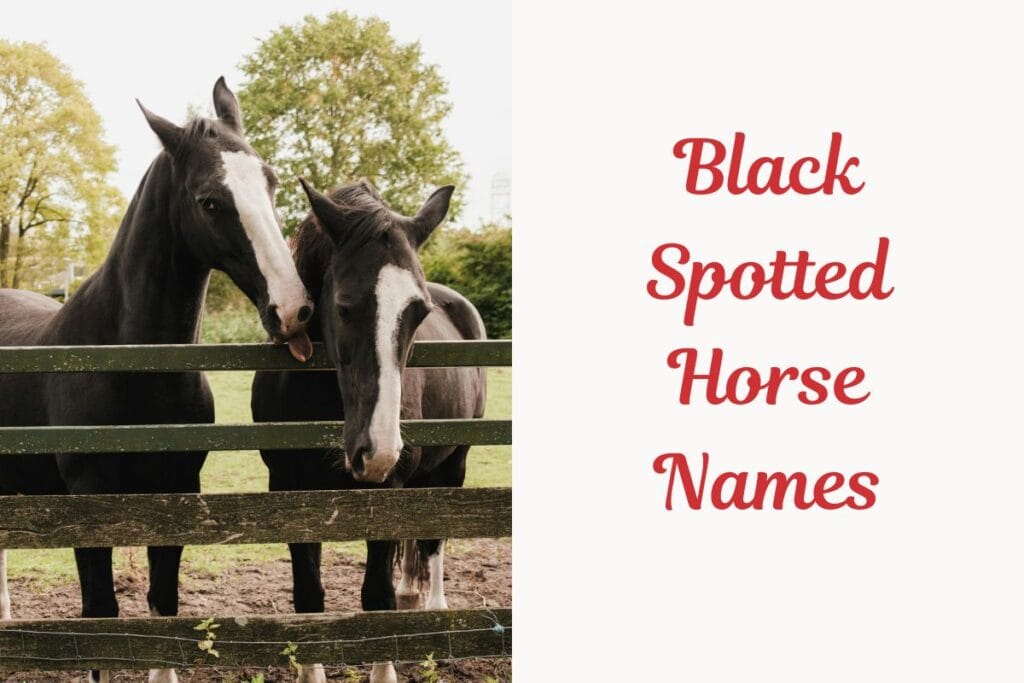
Black Spotted Horse Names highlight the beauty and uniqueness of their striking coat patterns.
From playful names like “Domino” to elegant choices like “Tuxedo,” these names capture their bold and eye-catching appearance while reflecting their personality.
1. Domino
Pronunciation: DOH-mee-noh
Meaning: Refers to the classic black-and-white pattern of domino tiles.
Origin & usage: Inspired by the game’s distinctive pattern, Domino is a playful and fitting name for black-spotted horses, particularly those with symmetrical markings.
2. Onyx
Pronunciation: AW-niks
Meaning: A precious black gemstone with layers of color.
Origin & usage: This name emphasizes elegance and strength, ideal for horses with bold black spots that evoke a gemstone’s beauty.
3. Marble
Pronunciation: MAHR-buhl
Meaning: A smooth, multi-colored stone with natural patterns.
Origin & usage: Perfect for horses with intricate spotted coats, Marble highlights natural artistry and grace.
4. Speckles
Pronunciation: SPEK-uhlz
Meaning: Tiny spots or marks scattered over a surface.
Origin & usage: This whimsical name suits horses with an abundance of small, playful spots.
5. Inkblot
Pronunciation: INK-blot
Meaning: Resembling spilled ink, forming random patterns.
Origin & usage: A creative name for horses whose black spots appear like artistic ink designs on a white canvas.
6. Panda
Pronunciation: PAN-duh
Meaning: A beloved black-and-white bear.
Origin & usage: Cute and memorable, Panda suits spotted horses with endearing patterns reminiscent of the animal.
7. Freckles
Pronunciation: FREK-uhlz
Meaning: Small spots on skin or fur.
Origin & usage: A fun, lighthearted name for horses with scattered dark spots across their coats.
You Might Also Like: 191 Japanese Horse Names with Meanings
8. Nightfall
Pronunciation: NYT-fawl
Meaning: The transition from day to night, often shadowed and mysterious.
Origin & usage: Ideal for horses whose black spots evoke twilight’s beauty and allure.
9. Eclipse
Pronunciation: ee-KLIPS
Meaning: An astronomical event where one celestial body shadows another.
Origin & usage: Suggesting mystery and grandeur, this name fits black-spotted horses with striking, dramatic coats.
10. Pepper
Pronunciation: PEP-uhr
Meaning: A spice with dark flecks.
Origin & usage: A lively name for spirited, speckled horses with peppery markings.
11. Orion
Pronunciation: oh-RY-uhn
Meaning: A prominent constellation in the night sky.
Origin & usage: A celestial name, perfect for horses with star-like spots resembling a constellation.
12. Tuxedo
Pronunciation: TUK-see-doh
Meaning: A formal black-and-white suit.
Origin & usage: Perfect for horses with sleek, elegant black spots, exuding sophistication.
13. Dapple
Pronunciation: DAP-uhl
Meaning: Marked with rounded spots or patches.
Origin & usage: A classic choice for horses with dappled coats, reflecting their natural beauty.
14. Oreo
Pronunciation: OHR-ee-oh
Meaning: A popular black-and-white cookie.
Origin & usage: A sweet, playful name for horses whose patterns resemble the iconic treat.
15. Inkspot
Pronunciation: INK-spot
Meaning: A distinct mark made by ink.
Origin & usage: Ideal for horses with bold, individual black spots, this name highlights their unique markings.
16. Galaxy
Pronunciation: GAL-uhk-see
Meaning: A system of stars and celestial bodies.
Origin & usage: Capturing the vastness and wonder of the universe, Galaxy is suited for horses with scattered spots like stars.
17. Raven
Pronunciation: RAY-vuhn
Meaning: A black-feathered bird symbolizing mystery and intelligence.
Origin & usage: A sleek, timeless name for black-spotted horses with a regal air.
18. Domino Effect
Pronunciation: DOH-mee-noh ef-FEKT
Meaning: A chain reaction triggered by one event.
Origin & usage: A quirky variation of Domino, suited for dynamic, high-spirited horses.
19. Patches
Pronunciation: PACH-uhz
Meaning: Irregular pieces or spots on a surface.
Origin & usage: A friendly, straightforward name for horses with irregular black markings.
20. Midnight
Pronunciation: MID-nyt
Meaning: The middle of the night, dark and serene.
Origin & usage: This poetic name befits horses with deep, dark spots that evoke nighttime tranquility.
21. Zorro
Pronunciation: ZOR-oh
Meaning: Spanish for “fox” and associated with a masked hero.
Origin & usage: A name full of mystery and charm, perfect for horses with bold black markings resembling a mask or cape.
22. Magpie
Pronunciation: MAG-pie
Meaning: A black-and-white bird known for its striking appearance.
Origin & usage: Ideal for horses with black and white patches, Magpie is a playful and memorable choice.
23. Phantom
Pronunciation: FAN-tuhm
Meaning: A mysterious or ghostly figure.
Origin & usage: Suited for horses with spots that give them a haunting, otherworldly appearance, like a phantom in the night.
24. Tux
Pronunciation: TUKS
Meaning: Short for tuxedo, a formal black-and-white suit.
Origin & usage: A refined and elegant name for horses with sharp, black spots, suggesting sophistication.
25. Checkers
Pronunciation: CHEK-ers
Meaning: A pattern made up of alternating squares, like a checkerboard.
Origin & usage: Perfect for horses whose black spots form geometric patterns reminiscent of a game of checkers.
26. Pongo
Pronunciation: PON-goh
Meaning: Named after the famous Dalmatian dog, known for its black spots.
Origin & usage: A fun and quirky name for spotted horses, capturing the playful spirit of a spotted dog.
27. Storm
Pronunciation: STORM
Meaning: A powerful, often dark weather phenomenon.
Origin & usage: This name suits horses whose black spots give them an intense, stormy look.
28. Bandit
Pronunciation: BAN-dit
Meaning: A person who engages in crime, often wearing a mask.
Origin & usage: Ideal for a horse with dark markings around its face, creating a “masked” appearance.
29. Badger
Pronunciation: BAJ-ur
Meaning: A nocturnal animal known for its black and white fur.
Origin & usage: A fitting name for horses with black-and-white markings resembling the distinctive fur of a badger.
30. Marble Eyes
Pronunciation: MAHR-buhl EYZ
Meaning: Eyes that resemble the swirling patterns of marble.
Origin & usage: This name emphasizes the beauty of a horse’s eyes, especially those with dark, striking patterns.
31. Panda Bear
Pronunciation: PAN-duh BEHR
Meaning: A black-and-white bear from China.
Origin & usage: A cute, endearing name for black-spotted horses with gentle, affectionate natures.
32. Chaco
Pronunciation: CHAH-koh
Meaning: Derived from the word “chaco,” meaning a wild place or nature reserve.
Origin & usage: Perfect for horses with rugged, nature-inspired markings and a free spirit.
33. Caviar
Pronunciation: KAV-ee-ar
Meaning: A luxurious food made from fish eggs, often black in color.
Origin &usage: A high-end name suited for horses with premium-looking black spots, reminiscent of luxury.
34. Puddle
Pronunciation: PUD-uhl
Meaning: A small pool of water, often dark and murky.
Origin &usage: A playful name for horses whose black spots look like little puddles across their coats.
35. Blotch
Pronunciation: BLOTCH
Meaning: A large irregular mark or stain.
Origin &usage: A bold name for horses with irregular, striking black patches on their coats.
36. Phantom Spot
Pronunciation: FAN-tuhm SPOT
Meaning: A mysterious, ghost-like mark.
Origin &usage: A name perfect for black-spotted horses whose patterns evoke a sense of mystery.
37. Peppercorn
Pronunciation: PEP-ur-korn
Meaning: The small, round seed of the pepper plant, often black.
Origin &usage: A charming name for smaller black spots that resemble pepper grains.
38. Starlight
Pronunciation: STAR-lyte
Meaning: The light emitted by stars, often shining in the night sky.
Origin &usage: Ideal for horses whose spots appear as bright as stars in the night sky.
39. Zinnia
Pronunciation: ZIN-ee-uh
Meaning: A type of flower, often multi-colored, with bold patterns.
Origin &usage: This name suits horses with bold, patterned markings that evoke the beauty of a colorful flower.
40. Cyclone
Pronunciation: SAI-klone
Meaning: A powerful storm, often characterized by intense winds.
Origin &usage: Perfect for strong-willed horses with a whirlwind of black spots that seem to swirl around their coats.
41. Taffy
Pronunciation: TAF-ee
Meaning: A sweet, chewy candy, often golden or dark in color.
Origin & usage: A cute name for a horse with soft, sweet spots, reminiscent of the delightful texture and color of taffy.
42. Carbon
Pronunciation: KAR-buhn
Meaning: A black element found in nature, often associated with strength and resilience.
Origin & usage: Ideal for horses with dark, strong spots, this name evokes the power and elegance of carbon.
43. Zulu
Pronunciation: ZOO-loo
Meaning: A reference to the Zulu people of South Africa, known for their rich culture and history.
Origin & usage: This name is great for horses with a strong presence, whose black spots evoke the bold spirit of the Zulu people.
44. Drift
Pronunciation: DRIFT
Meaning: A slow, steady movement, often associated with drifting snow or sand.
Origin & usage: A graceful name for horses with gently scattered black spots across their coats, giving them a flowing, drifting look.
45. Sable
Pronunciation: SAY-buhl
Meaning: A dark, luxurious fur, often associated with elegance.
Origin & usage: Suited for horses with deep black spots, this name exudes class and sophistication.
46. Ash
Pronunciation: ASH
Meaning: A light grey or black color, often seen in ashes after a fire.
Origin & usage: A fitting name for horses with a combination of dark and light spots, reminiscent of ash left behind by a flame.
47. Voodoo
Pronunciation: VOOD-oo
Meaning: A mystical practice often associated with supernatural powers.
Origin & usage: A mysterious and intriguing name for horses with black spots that have an enchanting, almost magical quality.
48. Taffeta
Pronunciation: TAF-uh-tuh
Meaning: A smooth, luxurious fabric, often shiny and elegant.
Origin & usage: Ideal for horses with sleek, glossy black spots, this name suggests beauty and refinement.
49. Magician
Pronunciation: muh-JISH-uhn
Meaning: A person skilled in the art of magic and illusions.
Origin & usage: Perfect for horses with black spots that seem to appear like magic, giving them an aura of mystery and wonder.
50. Inkwell
Pronunciation: INK-well
Meaning: A container for ink, often used for writing.
Origin & usage: A creative and fitting name for horses with deep, dark black spots, like ink spilled onto their coats.
50 White Spotted Horse Names
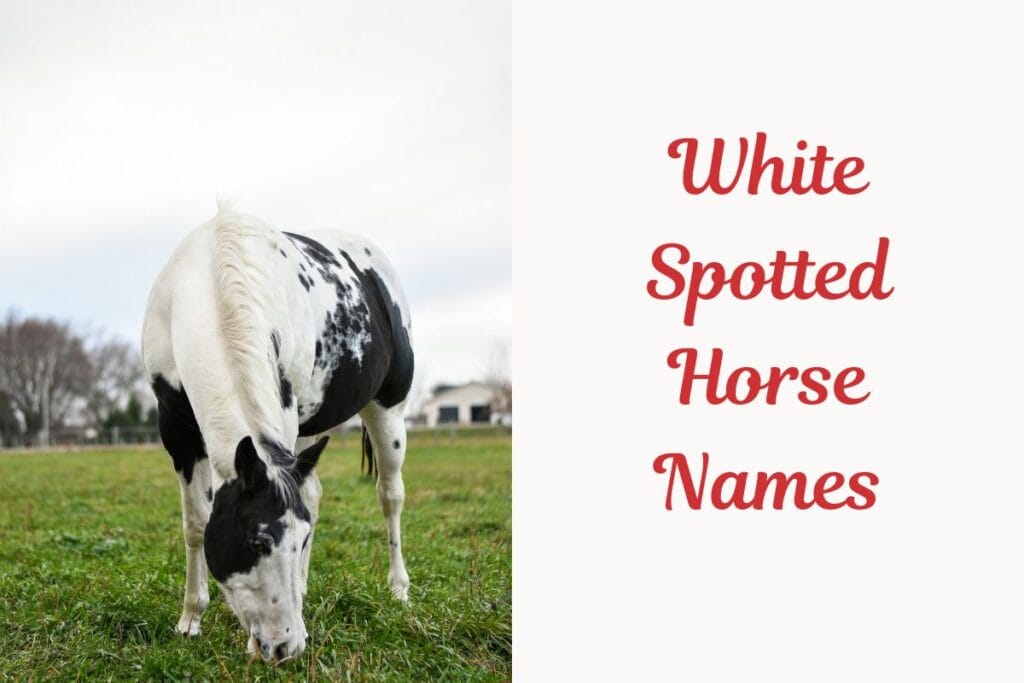
These names often draw inspiration from nature, patterns, and charm, like “Snowflake” for delicate spots or “Marble” for intricate patterns.
White-Spotted Horse Names capture the beauty and uniqueness of their coat.
They’re perfect for showcasing a horse’s distinctive appearance and playful personality.
1. Snowflake
Pronunciation: snəʊfleɪk
Meaning: A unique, delicate snow crystal.
Origin & Usage: This name reflects the horse’s purity and elegance, ideal for a horse with soft white markings like snowflakes.
2. Blizzard
Pronunciation: blɪzəd
Meaning: A severe snowstorm.
Origin & Usage: Commonly used for horses with bold, white markings or strong, majestic appearances that resemble powerful snowstorms.
3. Pearl
Pronunciation: pɜːrl
Meaning: A precious white gem formed in oysters.
Origin & Usage: Often used for a horse with glossy, white coat and shining spots, symbolizing beauty and rarity.
4. Cotton
Pronunciation: kɒtn
Meaning: A soft, white fabric.
Origin & Usage: Suitable for a gentle horse with soft, white fur, representing purity and softness.
5. Frost
Pronunciation: frɒst
Meaning: Frozen dew, often seen in cold weather.
Origin & Usage: A strong name for a horse with cool, white speckles, reflecting the beauty of a frosty morning.
6. Luna
Pronunciation: luːnə
Meaning: Moon.
Origin & Usage: Often chosen for a pale, moonlit horse with white markings, symbolizing serenity and calmness.
7. Ivory
Pronunciation: aɪvəri
Meaning: A creamy white material from elephant tusks.
Origin & Usage: Perfect for horses with soft, white coats or light spots, representing elegance and purity.
8. Glacier
Pronunciation: ɡleɪʃə
Meaning: A large mass of ice.
Origin & Usage: Used for horses with frosty white spots, evoking the powerful yet serene image of glaciers.
9. Opal
Pronunciation: oʊpəl
Meaning: A precious gemstone with play of color.
Origin & Usage: A great name for a horse with a white coat that has slight iridescent markings.
10. Marzipan
Pronunciation: mɑːrˌzɪpæn
Meaning: A sweet almond-based confection.
Origin & Usage: For a horse with sweet and subtle white spots, symbolizing sweetness and luxury.
11. Cloud
Pronunciation: klaʊd
Meaning: A visible mass of condensed water vapor.
Origin & Usage: Perfect for a horse with soft, fluffy white markings, resembling a peaceful cloud in the sky.
12. Marshmallow
Pronunciation: mɑːrʃˌmɛləʊ
Meaning: A soft, sweet treat.
Origin & Usage: Often used for gentle, white spotted horses, symbolizing warmth and sweetness.
13. Sugar
Pronunciation: ʃʊɡə
Meaning: A sweet, crystalline substance.
Origin & Usage: A fitting name for a white horse with soft, sweet personality or markings.
14. Snowball
Pronunciation: snəʊbɔːl
Meaning: A ball made of snow.
Origin & Usage: Reflects a white spotted horse that rolls playfully through the snow, symbolizing fun and lightness.
15. Crystal
Pronunciation: krɪstəl
Meaning: A clear, sparkling mineral.
Origin & Usage: Suitable for a horse with sparkling white patches, symbolizing clarity and brilliance.
16. Diamond
Pronunciation: daɪəmənd
Meaning: A precious gem known for its clarity and brilliance.
Origin & Usage: This name suits a horse with bright, white spots that shine like diamonds.
17. Snowdrop
Pronunciation: snəʊdrɒp
Meaning: A white spring flower.
Origin & Usage: A lovely name for a delicate horse with white spots, reminiscent of fresh snowdrops in early spring.
18. Vanilla
Pronunciation: vəˈnɪlə
Meaning: A sweet, fragrant flavor.
Origin & Usage: Often chosen for a horse with creamy white fur, symbolizing sweetness and simplicity.
19. Casper
Pronunciation: kæspə
Meaning: The friendly ghost.
Origin & Usage: For a playful horse with pale white markings, evoking a friendly and ethereal personality.
20. Dove
Pronunciation: dʌv
Meaning: A gentle bird, often white.
Origin & Usage: Perfect for a horse with soft, white markings, symbolizing peace and purity.
21. Marble
Pronunciation: mɑːbəl
Meaning: A smooth, stone material.
Origin & Usage: A strong name for a white horse with smooth, beautiful markings, reminiscent of marble sculptures.
22. Coconut
Pronunciation: kəʊkəˌnʌt
Meaning: A tropical fruit with a brown shell and white inside.
Origin & Usage: Ideal for a horse with a white coat or spotted markings, symbolizing tropical beauty.
23. Cloudberry
Pronunciation: klaʊdbɛri
Meaning: A rare golden fruit found in the wild.
Origin & Usage: Often used for a pale, white-spotted horse, symbolizing rarity and elegance.
24. Buttercup
Pronunciation: bʌtəkʌp
Meaning: A yellow flower.
Origin & Usage: A name for a horse with a delicate, white coat, evoking lightness and softness.
25. Glacier
Pronunciation: ɡleɪʃə
Meaning: A large ice mass.
Origin & Usage: A strong, bold name for a horse with frosty white markings, resembling a glacier’s cold elegance.
26. Tundra
Pronunciation: tʌndrɑ
Meaning: A cold, treeless region.
Origin & Usage: Suited for a horse with a cold-white appearance, evoking the raw beauty of tundra landscapes.
27. Winter
Pronunciation: wɪntə
Meaning: The coldest season of the year.
Origin & Usage: For horses with a frosty appearance, symbolizing the quiet beauty of winter’s touch.
28. Frostbite
Pronunciation: frɒstbaɪt
Meaning: A condition caused by freezing temperatures.
Origin & Usage: A name for a horse with striking white spots, resembling the icy sharpness of frostbite.
29. Shiver
Pronunciation: ʃɪvə
Meaning: To shake from cold or excitement.
Origin & Usage: A playful name for a horse with light white markings, symbolizing their spirited energy.
30. Milk
Pronunciation: mɪlk
Meaning: A creamy liquid produced by mammals.
Origin & Usage: For a horse with pale, creamy white spots, representing nourishment and purity.
31. Snowstorm
Pronunciation: snəʊstɔːm
Meaning: A heavy snow and wind event.
Origin & Usage: Perfect for a horse with bold, white markings that evoke the intensity and beauty of a snowstorm.
32. Puff
Pronunciation: pʌf
Meaning: A light breath of air.
Origin & Usage: A cute name for a white spotted horse that puffs through their actions, symbolizing lightness.
33. Stardust
Pronunciation: stɑːdʌst
Meaning: The fine particles of matter from stars.
Origin & Usage: Perfect for a horse with shimmering white spots, evoking the magic and wonder of stardust across the night sky.
34. Puffin
Pronunciation: pʌfɪn
Meaning: A small seabird with a white belly.
Origin & Usage: A playful name for a horse with soft, white markings, reflecting the light-hearted nature of the bird.
35. Meringue
Pronunciation: məˈræŋ
Meaning: A sweet, light dessert made from whipped egg whites.
Origin & Usage: Suited for a horse with a light, airy white coat or markings, symbolizing sweetness and delicacy.
36. Vanilla Bean
Pronunciation: vəˈnɪlə biːn
Meaning: The pod from the vanilla plant.
Origin & Usage: A lovely name for a horse with creamy white markings, symbolizing flavor, warmth, and sweetness.
37. Fawn
Pronunciation: fɔːn
Meaning: A young deer, often light brown or white.
Origin & Usage: Best used on pale horses with white markings that suggest the innocence and gentleness of a fawn.
38. Dove
Pronunciation: dʌv
Meaning: A bird symbolizing peace, often white.
Origin & Usage: A perfect name for a horse with calm, soft white markings, symbolizing peace and serenity.
39. Frosty
Pronunciation: frɒsti
Meaning: Covered with frost, cold.
Origin & Usage: A playful name for a white horse with frosty white spots or markings, reflecting winter’s crisp touch.
40. Buttercream
Pronunciation: bʌtəkriːm
Meaning: A sweet, creamy frosting.
Origin & Usage: Suited for a horse with light, smooth white markings, symbolizing softness and sweetness.
41. Cottonball
Pronunciation: kɒtnbɔːl
Meaning: A small ball of cotton, soft and white.
Origin & Usage: Ideal for a soft and fluffy horse with white spots, embodying gentleness and purity.
42. Glimmer
Pronunciation: ɡlɪmər
Meaning: A faint, shimmering light.
Origin & Usage: A fitting name for a horse with subtle white markings that shine in the light, symbolizing elegance.
43. Champagne
Pronunciation: ʃæmˈpeɪn
Meaning: A pale yellowish-white sparkling wine.
Origin & Usage: Great for a white horse with soft cream or gold spots, reflecting luxury and celebration.
44. Snow Queen
Pronunciation: snəʊ kwiːn
Meaning: A queen of snow, symbolizing winter’s royalty.
Origin & Usage: Ideal for a graceful white horse with spots, evoking images of winter royalty and beauty.
45. Whiteout
Pronunciation: waɪt aʊt
Meaning: A weather condition where snow or fog reduces visibility.
Origin & Usage: Suitable for a horse with a completely white or speckled coat, symbolizing a striking presence.
46. Moonbeam
Pronunciation: muːnbiːm
Meaning: A beam of light from the moon.
Origin & Usage: Ideal for a horse with silvery white spots, resembling beams of moonlight on a quiet night.
47. Iceberg
Pronunciation: aɪsbɜːɡ
Meaning: A large mass of ice floating in water.
Origin & Usage: A strong name for a white spotted horse, representing the majestic and formidable nature of an iceberg.
48. Coconut Cream
Pronunciation: kəʊkəˌnʌt kriːm
Meaning: A sweet, creamy filling made from coconut.
Origin & Usage: A gentle and sweet name for a horse with light white markings, symbolizing softness and sweetness.
49. Parchment
Pronunciation: pɑːtʃmənt
Meaning: A type of thin, light paper.
Origin & Usage: Perfect for a horse with light, white markings resembling the smooth texture of parchment, symbolizing grace and history.
30 Brown Spotted Horse Names
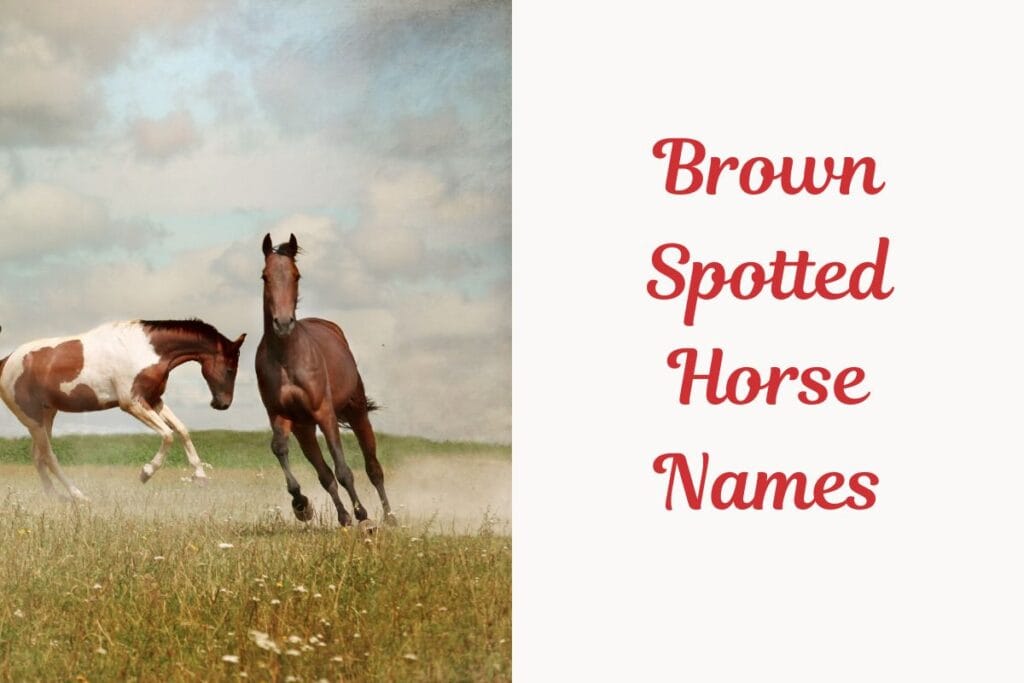
The unique markings and warm colors of Brown Spotted Horses deserve names that reflect these characteristics.
From nature-inspired choices like “Pebble” or “Hazel” to playful names like “Toffee” or “Speckles,” these names celebrate their earthy beauty and charm.
1. Cocoa
Pronunciation: KOH-kah
Meaning: A rich, brown color resembling the popular sweet treat.
Origin & Usage: Commonly used for horses with a deep brown coat, especially spotted ones, evoking warmth and sweetness.
2. Mocha
Pronunciation: MOH-kah
Meaning: A blend of dark brown and coffee tones.
Origin & Usage: Derived from the coffee beverage, often used for horses with a deep brown or speckled coat resembling coffee and chocolate.
3. Chestnut
Pronunciation: CHESS-nut
Meaning: A reddish-brown color resembling the chestnut tree’s nuts.
Origin & Usage: Often used for horses with reddish-brown coats, including those with spotted patterns of dark and light patches.
4. Maple
Pronunciation: MAY-puhl
Meaning: A warm, reddish-brown color like maple syrup or trees.
Origin & Usage: Popular for horses with a medium brown coat, especially those with unique spots or lighter markings.
5. Tawny
Pronunciation: TAW-nee
Meaning: A warm, yellowish-brown color.
Origin & Usage: Suitable for horses with golden or brownish coats, especially those with a mixture of light and dark patches.
6. Cinnamon
Pronunciation: SIN-uh-muhn
Meaning: A reddish-brown spice.
Origin & Usage: A great name for horses with reddish-brown or speckled coats, often used for horses with warm brown tones and spots.
7. Hazel
Pronunciation: HAY-zuhl
Meaning: A light brown color, like the hazelnut.
Origin & Usage: Often used for horses with brown coats or those that have a mix of brown and lighter markings
.
8. Caramel
Pronunciation: KAHR-uh-muhl
Meaning: A sweet, golden-brown color.
Origin & Usage: This name suits horses with a smooth brown coat or those with lighter, caramel-colored patches or spots.
9. Butterscotch
Pronunciation: BUHT-er-skotch
Meaning: A sweet, light brown color.
Origin & Usage: A playful name for horses with soft brown or yellowish-brown coats, including those with spotted patterns.
10. Walnut
Pronunciation: WAWL-nut
Meaning: A deep brown color like the nut’s shell.
Origin & Usage: Great for horses with dark brown coats and spots or unique markings, inspired by the deep brown of walnut wood.
11. Sandy
Pronunciation: SAN-dee
Meaning: A pale brown color resembling sand.
Origin & Usage: Often used for horses with light brown coats, especially those that are speckled or have tan patches
.
12. Pecan
Pronunciation: PEE-kan
Meaning: A brownish color like the nut’s shell.
Origin & Usage: Ideal for horses with brown coats that have a reddish hue, often used for spotted horses with a mixture of light and dark tones.
13. Mocha Latte
Pronunciation: MOH-kah LAH-tay
Meaning: A creamy brown color mixed with coffee.
Origin & Usage: Perfect for horses with a combination of dark brown and light spots or a latte-colored coat with darker speckles.
14. Fawn
Pronunciation: FAWN
Meaning: A light brown or tan color.
Origin & Usage: Often used for horses with a light brown or reddish-brown coat, especially those with spots resembling a fawn’s pelt.
15. Buckskin
Pronunciation: BUHK-skin
Meaning: A golden-tan color, often spotted.
Origin & Usage: Derived from the color of tanned deer hide, this name suits horses with tan or light brown coats with darker spots.
16. Biscuit
Pronunciation: BIS-kit
Meaning: A light brown color, like a baked biscuit.
Origin & Usage: Used for horses with warm brown coats, often spotted with a lighter or darker shade.
17. Copper
Pronunciation: KOP-er
Meaning: A reddish-brown color like the metal.
Origin & Usage: Great for horses with a reddish-brown coat, especially those with dark spots or specks resembling copper.
18. Ginger
Pronunciation: JIN-jer
Meaning: A reddish-brown color, like the spice.
Origin & Usage: Used for horses with a warm reddish-brown or spotted coat, often with a lively and energetic character.
19. Nutmeg
Pronunciation: NUT-meg
Meaning: A warm, brownish color resembling the spice.
Origin & Usage: Perfect for horses with brown or reddish-brown coats that have specks or spots, inspired by the nutmeg spice.
20. Clover
Pronunciation: CLOH-ver
Meaning: A greenish-brown color, like the clover plant.
Origin & Usage: Suitable for horses with brown coats that have darker spots or those with a speckled appearance, named after the natural plant.
21. Truffle
Pronunciation: TRUH-fuhl
Meaning: A rich, dark brown color like the truffle fungus.
Origin & Usage: Ideal for horses with deep brown coats and unique spots, evoking the luxury of the truffle.
22. Sable
Pronunciation: SAY-buhl
Meaning: A dark brown or blackish-brown color.
Origin & Usage: Often used for horses with a darker brown coat, especially those with lighter spots or highlights.
23. Whiskey
Pronunciation: WISS-kee
Meaning: A warm, amber-brown color.
Origin & Usage: Popular for horses with a rich brown coat, this name is often chosen for those with lighter specks or an amber hue.
24. Taffy
Pronunciation: TAF-ee
Meaning: A sweet, light brown color.
Origin & Usage: Best for horses with brown coats that have caramel or lighter brown patches and spots, resembling taffy candy.
25. Latte
Pronunciation: LAH-tay
Meaning: A creamy, light brown color like the coffee drink.
Origin & Usage: Used for horses with light brown coats and spots, often with a soft, light appearance.
26. Gingerbread
Pronunciation: JIN-jur-bred
Meaning: A reddish-brown color, like the gingerbread cookie.
Origin & Usage: A perfect name for horses with warm brown or reddish coats, especially those with darker or lighter spots.
27. Hazelnut
Pronunciation: HAY-zuhl-nut
Meaning: A medium brown color, like the hazelnut shell.
Origin & Usage: A great name for horses with brown coats and those that feature darker or lighter speckled markings.
28. Tawny Oak
Pronunciation: TAW-nee OH-k
Meaning: A brown color similar to oak wood.
Origin & Usage: Ideal for horses with rich brown or golden brown coats, often with natural-looking spots or darker patches.
29. Pudding
Pronunciation: PUHD-ing
Meaning: A light brown, creamy color.
Origin & Usage: Suited for horses with a soft, light brown coat, particularly those with a dappled or speckled appearance.
30. Toffee
Pronunciation: TOH-fee
Meaning: A rich, golden-brown color, like the candy.
Origin & Usage: Great for horses with warm brown or golden coats, especially those with lighter or darker spots.
30 Male Spotted Horse Names
Male Spotted Horse Names often highlight strength, character, and the unique patterns of their coats.
Names can be inspired by nature, bold characteristics, or even famous figures to give your horse a distinctive and memorable identity.
1. Blaze
Pronunciation: bleɪz
Meaning: A bright streak of color or a white mark on the horse’s face.
Origin & usage: Commonly used for horses with white marks on their faces, Blaze represents a striking appearance, often given to those with a dominant spot or patch on the head or body.
2. Pinto
Pronunciation: pɪntoʊ
Meaning: A horse with a coat of large patches of white and another color, usually brown or black.
Origin & usage: Derived from the Spanish word “pinto,” referring to the distinctive patchy coloration often seen in spotted horses, frequently associated with breeds like the American Paint Horse.
3. Dalmatian
Pronunciation: ˌdælˈmeɪʃən
Meaning: Named after the Dalmatian dog breed known for its black spots.
Origin & usage: Often used for horses with black spots over white coats, Dalmatian evokes the breed’s iconic spotted pattern, commonly chosen for show horses or those with distinctive coats.
4. Freckles
Pronunciation: frɛkəlz
Meaning: Small, scattered spots or marks on the skin.
Origin & usage: A playful name for a horse with small spots on its coat, often used affectionately for animals with a pattern of light or dark markings resembling freckles.
5. Spot
Pronunciation: spɒt
Meaning: A small, round mark or area of different color on the coat.
Origin & usage: One of the simplest and most popular names for a spotted horse, Spot is widely used to describe any horse with noticeable colored markings, particularly those with small spots.
6. Apache
Pronunciation: əˈpætʃi
Meaning: A Native American tribe, often symbolizing a strong, brave spirit.
Origin & usage: Named after the Apache tribe, this name fits spotted horses that carry an air of power and resilience, with some horses having mottled or dappled coats resembling tribal markings.
7. Marble
Pronunciation: mɑːrbl
Meaning: A smooth, variegated stone, often spotted or streaked.
Origin & usage: Ideal for horses with a mixed, spotted coat pattern, Marble evokes the visual appeal of marble stones, often used for horses with a mix of light and dark spots.
8. Camo
Pronunciation: kæmoʊ
Meaning: Short for camouflage, referring to a pattern that blends in with surroundings.
Origin & usage: For horses whose spots are irregular or blend into their natural surroundings, Camo is perfect for a horse with a coat that features varied spots or patterns mimicking camouflage.
9. Patches
Pronunciation: pætʃɪz
Meaning: A name for a horse with several distinct colored patches.
Origin & usage: Commonly used for horses with irregular patches of color, Patches fits any horse displaying a diverse, multicolored coat, often seen in pintos or paint horses.
10. Tux
Pronunciation: tʌks
Meaning: Short for the tuxedo, referring to a formal black-and-white suit.
Origin & usage: Ideal for horses with a black and white spotted coat, the Tux evokes the elegance and sharp contrast seen in formal attire, often named for horses with tuxedo-like markings.
11. Ace
Pronunciation: eɪs
Meaning: The best, a top performer.
Origin & usage: While not specifically tied to spots, Ace is often used for horses who excel in performance or have outstanding coat patterns, including those with distinctive spots.
12. Zorro
Pronunciation: zɔːroʊ
Meaning: The legendary masked vigilante known for his iconic black-and-white mask.
Origin & usage: A fitting name for a horse with a black and white spotted coat, Zorro evokes images of the daring hero, often associated with horses bearing striking patterns.
13. Bandit
Pronunciation: bændɪt
Meaning: A thief or outlaw, often wearing a mask or hood.
Origin & usage: This name suits horses with dark patches around their eyes, resembling a masked bandit, and works well for spotted horses with dark facial markings.
14. Jasper
Pronunciation: dʒæspər
Meaning: A semi-precious stone often spotted with various colors.
Origin & usage: Perfect for a horse with a variety of spots or patterns across its coat, Jasper is a stone name symbolizing beauty and uniqueness, fitting for a horse with an exceptional spotted appearance.
15. Bingo
Pronunciation: bɪŋɡoʊ
Meaning: A playful term often associated with winning or luck.
Origin & usage: Used for horses with a playful nature or interesting coat patterns, Bingo is often chosen for spotted horses that seem lucky or whimsical.
16. Cowboy
Pronunciation: kaʊbɔɪ
Meaning: A ranch worker or cowboy, traditionally associated with Western culture.
Origin & usage: A classic Western name often given to horses with distinctive spots, particularly those resembling cowhide, like the Appaloosa, which is famous for its spotted coat.
17. Sundance
Pronunciation: sʌndeɪns
Meaning: A reference to sunlight or a dance that celebrates the sun.
Origin & usage: Ideal for horses with bright, sun-like spots or a glowing appearance, Sundance is a fitting name for a horse with a radiant or dappled spotted coat.
18. Echo
Pronunciation: ɛkoʊ
Meaning: A sound that reflects off a surface, reverberating in the distance.
Origin & usage: Echo is perfect for a horse whose markings seem to reflect or repeat, much like an echo. It’s a name for horses with patterned spots that appear to mirror one another.
19. Dusty
Pronunciation: dʌsti
Meaning: Covered in or resembling dust, often a muted or faded color.
Origin & usage: Dusty is used for spotted horses whose markings are faint or subtle, like dusty clouds or trails in the sand, and common for horses with light or soft spot patterns.
20. Thunder
Pronunciation: θʌndər
Meaning: A loud, rumbling sound, often following lightning.
Origin & usage: Thunder works for horses with bold, strong markings or those who carry a presence that commands attention, including spotted horses with striking, storm-like patterns.
21. Ranger
Pronunciation: reɪndʒər
Meaning: A forest guard or lawman.
Origin & usage: Perfect for horses that appear wild or free-spirited, with spotted coats resembling natural environments or camouflaged patterns, often chosen for horses with a rugged look.
22. Scout
Pronunciation: skaʊt
Meaning: A person sent to explore or observe, often in a wilderness setting.
Origin & usage: Ideal for a horse with a keen eye and sharp markings, Scout fits well with spotted horses that are alert and vigilant, known for their unique coat patterns.
23. Clyde
Pronunciation: klaɪd
Meaning: A traditional Scottish name, often used for large draft horses.
Origin & usage: Clyde is a strong and sturdy name for a spotted horse, especially those with a large frame, often used for horses with patches or spots that signify strength and endurance.
24. Smokey
Pronunciation: smoʊki
Meaning: A soft, misty gray color or appearance.
Origin & usage: Smokey is a name that suits horses with grayish spots or dapples, creating an ethereal, smoky look on the horse’s coat, often chosen for those with a mysterious or elusive presence.
25. Storm
Pronunciation: stɔːrm
Meaning: A violent weather condition with thunder, rain, and wind.
Origin & usage: Storm is perfect for a horse with bold, dynamic spots, especially those with patterns that evoke the power and unpredictability of a storm, adding strength to the name.
26. Oreo
Pronunciation: ɔːrioʊ
Meaning: A chocolate and vanilla cookie, often used for black-and-white animals.
Origin & usage: Ideal for horses with a black and white spotted pattern, Oreo reflects the strong contrast of colors seen in the famous cookie, often used for horses with similar coloring.
27. Buck
Pronunciation: bʌk
Meaning: A male deer or antelope, symbolizing agility and strength.
Origin & usage: A strong and resilient name for a spotted horse, often used for horses that demonstrate great agility and stamina, including those with wild or untamed spots.
28. Rocky
Pronunciation: rɒki
Meaning: A name that evokes strength and ruggedness, like a rocky landscape.
Origin & usage: Rocky is used for horses with a strong, powerful appearance, particularly those with tough, sturdy coats that feature distinct spots resembling rocky terrains.
29. Duke
Pronunciation: duːk
Meaning: A nobleman or high-ranking royal.
Origin & usage: Often chosen for horses with distinguished markings or a noble appearance, a Duke fits a horse with elegant or well-defined spots that set them apart as regal and grand.
30. Whiskey
Pronunciation: wɪski
Meaning: A distilled alcoholic beverage, often associated with strength and character.
Origin & usage: Whiskey is used for horses with a unique, spotted coat pattern and a bold personality, perfect for a horse that stands out with its spots and its spirited nature.
30 Female Spotted Horse Names
Female Spotted Horse Names often capture beauty, elegance, and charm. They can reflect the horse’s unique patterns, personality, or natural grace.
There is a wide variety of names to celebrate female beauty and individuality, from playful names such as “Polka” to sophisticated names such as “Luna.”
1. Luna
Pronunciation: LOO-nah
Meaning: Moon
Origin & Usage: Derived from Latin, “Luna” represents the moon, symbolizing calmness and grace. It is a popular name for horses with a gentle temperament and mystical aura.
2. Patches
Pronunciation: PATCH-ess
Meaning: A variety of colored patches
Origin & Usage: The name Patches is commonly used for horses with distinct, colorful markings. It evokes the image of a horse with irregular, spotty patterns on its coat.
3. Daisy
Pronunciation: DAY-zee
Meaning: A flower symbolizing purity
Origin & Usage: A classic English name for a spotted horse with a soft, cheerful temperament. The daisy flower represents innocence and beauty.
4. Freckles
Pronunciation: FREK-ulz
Meaning: Small, light brown spots
Origin & Usage: Freckles are often used for horses with tiny, light-colored spots across their bodies, symbolizing uniqueness and charm.
5. Taffy
Pronunciation: TAF-ee
Meaning: Sweet and sticky, like the candy
Origin & Usage: A playful name for a horse with a sweet, gentle personality and a patchy coat. Taffy refers to a texture, often used for colorful or speckled horses.
6. Star
Pronunciation: STAR
Meaning: A shining celestial body
Origin & Usage: Popular for horses with a distinctive white star-shaped spot on their foreheads. A star represents brightness, agility, and uniqueness.
7. Rosie
Pronunciation: ROH-zee
Meaning: Rose, a symbol of love and beauty
Origin & Usage: A sweet name for a spotted mare, often chosen for its association with grace, elegance, and warmth, like the rosy glow of the sky.
8. Cocoa
Pronunciation: KOH-koh
Meaning: A rich brown color
Origin & Usage: Used for horses with brown or chocolate-colored spots. It symbolizes warmth and richness, often signifying a calm and steady nature.
9. Pebbles
Pronunciation: PEH-bulz
Meaning: Small stones
Origin & Usage: Pebbles is a fitting name for a horse with small, circular spots on their coat, representing the varied beauty of nature.
10. Cinnamon
Pronunciation: SIN-ah-mon
Meaning: A warm spice with reddish-brown color
Origin & Usage: Often used for horses with reddish spots. Cinnamon signifies warmth, energy, and spice, often chosen for horses with lively personalities.
11. Buttercup
Pronunciation: BUT-er-kup
Meaning: A yellow flower
Origin & Usage: A sweet, soft name for a horse with yellow or pale spots. Buttercup is a symbol of happiness, purity, and delicate beauty.
12. Sable
Pronunciation: SAY-bul
Meaning: Dark, rich color
Origin & Usage: Sable refers to a deep, dark coat color, often used for horses with dark spots or accents. It symbolizes mystery and elegance.
13. Twinkle
Pronunciation: TWINK-ul
Meaning: A small, shining light
Origin & Usage: Perfect for a horse with bright, shining spots on their coat. Twinkle represents liveliness and a sparkling personality.
14. Clover
Pronunciation: CLOH-ver
Meaning: A lucky plant
Origin & Usage: Clover is often used for spotted horses with a gentle, easy-going nature, symbolizing good fortune and growth.
15. Maple
Pronunciation: MAY-pul
Meaning: A type of tree with colorful leaves
Origin & Usage: Maple refers to both the tree and the syrup, symbolizing sweetness and natural beauty, often given to spotted horses with brown hues.
16. Tinkerbell
Pronunciation: TINK-er-bell
Meaning: A small, mischievous fairy
Origin & Usage: Popularized by the fairy from Peter Pan, Tinkerbell is often used for small, energetic horses with light, spotty coats.
17. Pepper
Pronunciation: PEH-per
Meaning: A spicy seasoning
Origin & Usage: Suitable for a horse with black or grey spots, Pepper is a lively, energetic name symbolizing spice and boldness.
18. Buttons
Pronunciation: BUT-uhns
Meaning: Small round fasteners
Origin & Usage: A sweet name for a horse with small, evenly spaced spots on their coat. Buttons signify charm and small but distinctive beauty.
19. Trixie
Pronunciation: TRIK-see
Meaning: A playful, clever person
Origin & Usage: Often given to mischievous or fun horses, Trixie is a name that reflects a playful and curious personality.
20. Snowflake
Pronunciation: SNOW-flayk
Meaning: A unique ice crystal
Origin & Usage: Perfect for horses with white spots on their coats, symbolizing uniqueness and purity. Snowflake reflects grace and individuality.
21. Peaches
Pronunciation: PEE-chiz
Meaning: A soft, fuzzy fruit
Origin & Usage: This name is ideal for a spotted horse with a warm, peach-toned coat or personality, representing sweetness and softness.
22. Misty
Pronunciation: MIS-tee
Meaning: Light fog or mist
Origin & Usage: Misty is often used for horses with soft, faded spots or a quiet, serene temperament. It symbolizes mystery and calmness.
23. Jellybean
Pronunciation: JEL-ee-bean
Meaning: A small, colorful candy
Origin & Usage: Jellybean suits a spotted horse with colorful, lively patterns. It suggests a sweet, fun personality with a burst of energy.
24. Marble
Pronunciation: MAHR-bul
Meaning: A smooth, polished stone
Origin & Usage: Marble is a fitting name for a horse with a glossy, multicolored coat, symbolizing beauty, strength, and smoothness.
25. Bubbles
Pronunciation: BUB-ulz
Meaning: Small, round air pockets in liquids
Origin & Usage: Bubbles is perfect for a playful, lively horse with light, round spots. It represents joy, fun, and a bubbly personality.
26. Sugar
Pronunciation: SHOOG-er
Meaning: A sweet, crystalline substance
Origin & Usage: Sugar is a soft, sweet name for a spotted horse with a kind demeanor. It represents warmth, sweetness, and friendliness.
27. Jasmine
Pronunciation: JAZ-min
Meaning: A fragrant flower
Origin & Usage: Often given to horses with delicate or fragrant coats, Jasmine symbolizes beauty, femininity, and elegance.
28. Poppy
Pronunciation: PAH-pee
Meaning: A bright red flower
Origin & Usage: Poppy is a cheerful name for a horse with bright, noticeable spots. It represents vitality, energy, and beauty.
29. Mist
Pronunciation: MIST
Meaning: A fine spray of water vapor
Origin & Usage: Mist is ideal for horses with soft, light-colored spots or a mysterious demeanor. It symbolizes gentleness and serenity.
30. Amber
Pronunciation: AM-bur
Meaning: A golden-yellow gemstone
Origin & Usage: Amber is fitting for horses with golden or amber-colored spots, symbolizing warmth, strength, and natural beauty.
25 Cute Spotted Horse Names
There are some Cute Names for Spotted Horses that highlight their unique markings and charm.
Playful options like Dotty, Freckles, or Sprinkles highlight their sweet and whimsical personalities while celebrating their one-of-a-kind coats.
1. Patches
Pronunciation: pæʧɪz
Meaning: Refers to small, irregular spots or patches of color.
Origin & Usage: A playful name for horses with a patchwork coat. It’s often used for horses with unique spotted markings, symbolizing individuality.
2. Dotty
Pronunciation: dɒti
Meaning: Covered in dots or spots.
Origin & Usage: A whimsical name, perfect for a horse with small, scattered spots. Often used in a playful or affectionate context.
3. Freckles
Pronunciation: frɛkəlz
Meaning: Small, light spots often found on the skin.
Origin & Usage: A cute name for a horse with freckle-like spots on its coat, commonly used in a fun and endearing manner.
4. Speckles
Pronunciation: spɛkəlz
Meaning: Tiny spots or dots scattered across the surface.
Origin & Usage: A charming name for a horse with numerous small spots, evoking the appearance of speckles on a canvas.
5. Marbles
Pronunciation: mɑːbəlz
Meaning: Round spots resembling the appearance of marbles.
Origin & Usage: Ideal for a horse with round, distinct spots. The name is cute and lively, often used for playful and energetic horses.
6. Tootsie
Pronunciation: tʊtsi
Meaning: A sweet, affectionate nickname.
Origin & Usage: Often used for smaller horses with a cute, spotted coat. The name conveys affection and charm.
7. Cloud
Pronunciation: klaʊd
Meaning: Fluffy, light, and soft, like a cloud.
Origin & Usage: Perfect for a horse with light, airy spots. It symbolizes lightness and is used for gentle, graceful horses.
8. Tinker
Pronunciation: tɪŋkər
Meaning: Referring to small patches or marks.
Origin & Usage: Commonly used for horses with uneven, quirky spots. It’s a playful and endearing name often given to spotted ponies.
9. Cinnamon
Pronunciation: sɪnəmən
Meaning: A warm, reddish-brown spice.
Origin & Usage: A sweet and spicy name for a horse with darker spots on a light coat. Often associated with a warm, friendly nature.
10. Buttons
Pronunciation: bʌtənz
Meaning: Small, round objects resembling buttons.
Origin & Usage: A cute name for a horse with small, circular spots. The name is often associated with something small, precious, and charming.
11. Biscuit
Pronunciation: bɪskɪt
Meaning: A sweet, golden-brown treat.
Origin & Usage: A name fitting for a horse with light-colored spots or patches. It suggests warmth, comfort, and sweetness.
12. Peaches
Pronunciation: piːʧɪz
Meaning: A soft, fuzzy fruit with a pinkish hue.
Origin & Usage: A soft, sweet name perfect for a horse with soft, pastel-like spots. It conveys a gentle, lovable personality.
13. Snickers
Pronunciation: snɪkərz
Meaning: A sweet chocolate bar with caramel.
Origin & Usage: This name is great for a horse with a mix of darker and lighter spots. It’s a fun and cheeky name for a playful horse.
14. Sparkle
Pronunciation: spɑːrkəl
Meaning: To shine with a bright, shimmering light.
Origin & Usage: Perfect for a horse with bright, contrasting spots. The name suggests a lively and radiant personality.
15. Cupcake
Pronunciation: kʌpkeɪk
Meaning: A sweet, frosted dessert.
Origin & Usage: A cute name for a small horse with light-colored spots. It conveys sweetness and charm.
16. Sweets
Pronunciation: swiːts
Meaning: Something sugary or delightful.
Origin & Usage: A fitting name for a horse with a sugary-looking, speckled coat. It is used in affectionate contexts.
17. Poppy
Pronunciation: pɒpi
Meaning: A red or orange flower with delicate petals.
Origin & Usage: Suitable for a horse with vibrant spots on a lighter coat. The name evokes a cheerful and lively nature.
18. Butterscotch
Pronunciation: bʌtərˌskɒtʃ
Meaning: A rich, golden caramel treat.
Origin & Usage: A fitting name for a horse with a blend of light and dark spots. It’s sweet and warm, often used for horses with a soft, friendly demeanor.
19. Jellybean
Pronunciation: dʒɛlibiːn
Meaning: A small, colorful candy.
Origin & Usage: A playful name for a spotted horse, often with vibrant or contrasting patches. It suggests a bubbly, fun personality.
20. Cocoa
Pronunciation: kəʊkəʊ
Meaning: A brownish color, like chocolate.
Origin & Usage: A great choice for a horse with dark spots on a light coat, evoking warmth and richness.
21. Taffy
Pronunciation: tæfi
Meaning: A chewy, caramel-like candy.
Origin & Usage: Ideal for a horse with a smooth, caramel-colored coat and lighter spots. It conveys a sense of sweetness and softness.
22. Fawn
Pronunciation: fɔːn
Meaning: A young deer with soft, brownish fur.
Origin & Usage: A name perfect for a horse with light spots, resembling the gentle colors of a fawn. It signifies softness and elegance.
23. Munchkin
Pronunciation: mʌntʃkɪn
Meaning: A small, cute person or creature.
Origin & Usage: A playful name for a tiny, spotted horse. Often used for smaller, cuter horses with adorable, distinctive markings.
24. Twinkle
Pronunciation: twɪŋkəl
Meaning: To shine or sparkle with reflected light.
Origin & Usage: A name for a horse whose spots twinkle or shine in the sunlight, giving it a magical, charming quality.
25. Skittles
Pronunciation: skɪtəlz
Meaning: A colorful candy, often with various colors.
Origin & Usage: Perfect for a horse with various spots in different colors. The name is vibrant, fun, and full of energy.
You Might Also Like: 300 + Most Popular Scottish Horse Names
15 Spotted Mythology and Legendary Horse Names
Spotted mythology and legendary horse names draw inspiration from various mythologies, folklore, and epic tales, often embodying traits like strength, grace, and mystical abilities.
These names, such as Pegasus, Sleipnir, and Bucephalus, invoke power, speed, and mythical significance.
They are perfect for horses with unique markings, reflecting the extraordinary nature of the creatures they are named after.
It does not matter whether the name of the horse is associated with Greek mythology, Norse mythology, Celtic mythology, or Hindu mythology.
Each name carries a rich history and can suit a spotted horse known for its beauty or legendary qualities.
1. Sleipnir
Pronunciation: SLAYP-neer
Meaning: “The slipper.”
Origin & Usage: Sleipnir is the eight-legged horse of Norse mythology, associated with Odin. Known for its speed and ability to traverse worlds, it’s ideal for a swift, unique spotted horse.
2. Pegasus
Pronunciation: PEG-uh-sus
Meaning: “Strong.”
Origin & Usage: From Greek mythology, Pegasus is the winged horse born from Medusa’s blood. This name symbolizes grace, strength, and mythical beauty, perfect for a striking spotted horse.
3. Xanthos
Pronunciation: ZAN-thos
Meaning: “Golden.”
Origin & Usage: Xanthos was one of Achilles’ immortal horses in Greek mythology. This name suits a spotted horse with a bold or golden-hued pattern, exuding power and resilience.
4. Balius
Pronunciation: BAY-lee-us
Meaning: “Swift.”
Origin & Usage: Partner with Xanthos in Greek myth, Balius was renowned for speed. A fitting name for a spotted horse known for its agility and determination.
5. Étaín
Pronunciation: AY-tawn
Meaning: “Shining one.”
Origin & Usage: In Irish mythology, Étaín is associated with beauty and transformation. This name complements a horse with radiant or unique spotted patterns.
6. Epona
Pronunciation: eh-POH-nuh
Meaning: “Horse goddess.”
Origin & Usage: The Celtic goddess Epona was a protector of horses. This powerful name is perfect for a cherished, regal spotted horse.
7. Arion
Pronunciation: AH-ree-on
Meaning: “Immortal.”
Origin & Usage: Arion, a swift, immortal horse in Greek myth, was said to speak. This name suits a spotted horse admired for its intelligence and elegance.
8. Uchchaihshravas
Pronunciation: OOH-chai-shrah-vahs
Meaning: “High-eared.”
Origin & Usage: A divine horse from Hindu mythology, Uchchaihshravas emerged from the churning of the ocean. Its association with grandeur fits a majestic spotted horse.
9. Slew
Pronunciation: SLOO
Meaning: “Swift.”
Origin & Usage: Inspired by Slew o’ Gold, a legendary racehorse, this name evokes strength and endurance, suitable for a dappled or spotted beauty.
10. Grani
Pronunciation: GRAH-nee
Meaning: “He who grows.”
Origin & Usage: Grani is Sigurd’s horse in Norse mythology, descended from Sleipnir. This name suits a spirited spotted horse with lineage or special traits.
11.Rocinante
Pronunciation: roh-see-NAHN-tay
Meaning: “Worn-out nag turned noble steed.”
Origin & Usage: Don Quixote’s loyal horse, Rocinante, represents transformation. Perfect for a spotted horse with a humble yet noble charm.
12. Bucephalus
Pronunciation: byoo-SEF-uh-lus
Meaning: “Ox-headed.”
Origin & Usage: Alexander the Great’s legendary horse, Bucephalus, symbolizes strength and loyalty. Ideal for a robust, spotted steed.
13. Tulpar
Pronunciation: TOOL-par
Meaning: “Winged horse.”
Origin & Usage: In Turkic mythology, Tulpar is a flying horse. Its name fits a spotted horse known for speed, grace, or unique patterns.
14. Hippogriff
Pronunciation: HIP-oh-griff
Meaning: “Half-horse, half-griffin.”
Origin & Usage: From Renaissance mythology, the Hippogriff represents rarity and beauty. A perfect name for a rare, uniquely spotted horse.
15. Kelpie
Pronunciation: KEL-pee
Meaning: “Waterhorse.”
Origin & Usage: Kelpies are shape-shifting water spirits from Scottish lore. A fitting name for a mysterious, strikingly patterned spotted horse.
25 Funny Spotted Horse Names
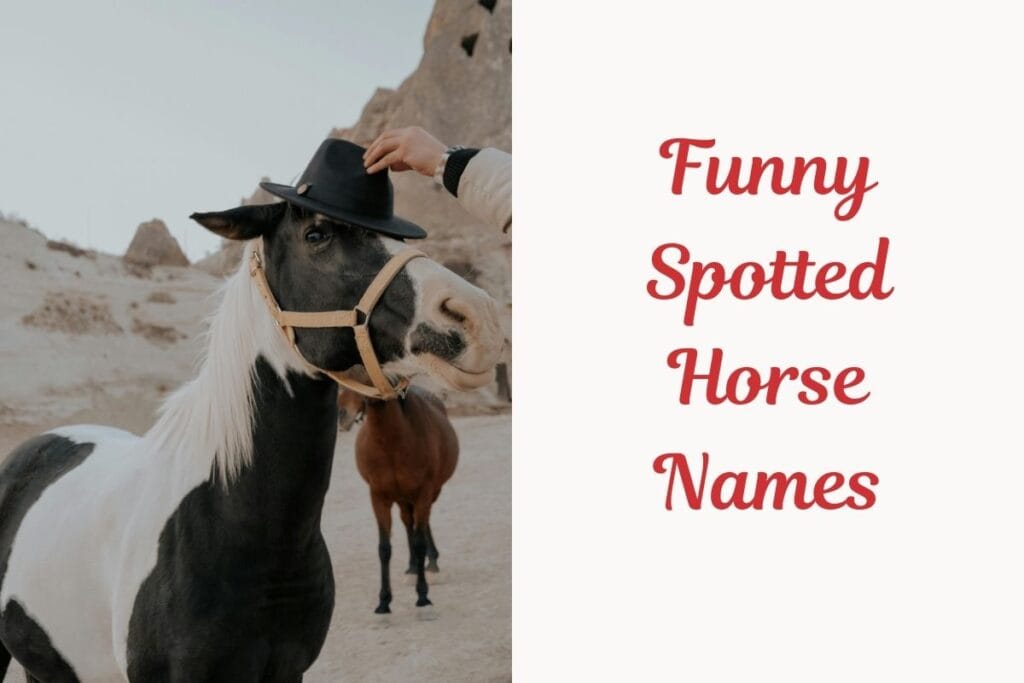
Funny Names bring a lighthearted charm to your spotted horse, highlighting their unique and playful markings.
Whether inspired by food, patterns, or quirky ideas, these names are sure to make you smile every time you call your horse!
1. Dotty
Pronunciation: dɒti
Meaning: A playful name for a horse with lots of spots.
Origin & Usage: Dotty is commonly used for horses with irregular markings, and it adds a humorous touch when referring to their unique spots. It’s often a lighthearted nickname for a quirky horse.
2. Freckles
Pronunciation: frɛkəlz
Meaning: Refers to the small, light spots often seen on horses with spotted coats.
Origin & Usage: Freckles are used to describe the small specks on a horse’s coat, often used humorously for horses with many small markings or a playful character.
3. Oreo
Pronunciation: ɔːˈriːəʊ
Meaning: A fun, sweet name for a black and white horse.
Origin & Usage: Often used on horses with dark and light spots, Oreo is inspired by the famous cookie. It’s a light-hearted, popular choice for spotted horses.
4. Patches
Pronunciation: pætʃɪz
Meaning: Refers to irregular, patch-like spots on the coat.
Origin & Usage: Patches is often used to describe horses with large, random spots. It’s a humorous name that emphasizes the horse’s distinct coat pattern.
5. Sprinkles
Pronunciation: sprɪŋkəlz
Meaning: A cute and light name for a horse with many small spots.
Origin & Usage: Sprinkles work well for horses with a soft, speckled pattern, giving off a playful and fun vibe. It’s often used for smaller, scattered spots.
6. Dalmatian
Pronunciation: dælˈmeɪʃən
Meaning: A name inspired by the iconic spotted dog breed.
Origin & Usage: Dalmatian is a cheeky name used for horses with a similar coat pattern to the Dalmatian dog, known for its distinctive black spots.
7. Smudge
Pronunciation: smʌdʒ
Meaning: A name for a horse with irregular or uneven spots.
Origin & Usage: Smudge is used for horses whose spots appear more like smears or irregular marks, giving them a unique and humorous appearance.
8. Tuxedo
Pronunciation: tʌkˈsiːdəʊ
Meaning: Refers to a horse with a black and white pattern resembling a tuxedo.
Origin & Usage: This name is often used for spotted horses with a black and white coat, giving them a sophisticated, yet funny name.
9. Zorro
Pronunciation: zɔːrəʊ
Meaning: Inspired by the masked hero, often associated with dark marks or spots.
Origin & Usage: Zorro is a fun name for horses with dark patches or markings, often used humorously for horses that have eye-catching spot patterns.
10. Marshmallow
Pronunciation: mɑːʃˌmælɔ
Meaning: A soft, fluffy name for a horse with light spots.
Origin & Usage: Marshmallow works well for horses with a light-colored coat and soft, irregular spots. It’s an affectionate and funny name for a gentle horse.
11. Pongo
Pronunciation: pɒŋɡəʊ
Meaning: A name from the 101 Dalmatians, referring to a playful spotted animal.
Origin & Usage: Pongo is inspired by the famous spotted dog from Disney’s 101 Dalmatians, and it’s often used for horses with lots of playful spots.
12. Spotty
Pronunciation: spɒti
Meaning: A straightforward and playful name for a horse with spots.
Origin & Usage: Spotty is a classic name for a horse with an abundance of spots. It’s fun, simple, and easy to remember.
13. Cowabunga
Pronunciation: kaʊəˈbʌŋɡə
Meaning: A funny and energetic name for a spotted horse.
Origin & Usage: Cowabunga comes from a fun, expressive word often associated with energy and excitement, perfect for a horse with a lot of energy and unique markings.
14. Inkblot
Pronunciation: ɪŋkblɒt
Meaning: A quirky name for a horse with random or abstract spots.
Origin & Usage: Inspired by inkblots, this name fits horses with irregular or artistic-looking spots, often making it humorous and creative.
15. Domino
Pronunciation: dɒmɪnəʊ
Meaning: A name that reflects the black and white contrast of domino tiles.
Origin & Usage: Domino is perfect for horses with black and white markings, adding a playful and lighthearted touch to a spotted coat.
16. Pepper
Pronunciation: pɛpə
Meaning: Refers to a horse with many small spots, like pepper grains.
Origin & Usage: Pepper is a funny name for horses that have a speckled coat, often used when the horse’s spots resemble pepper grains scattered across the body.
17. Tic-Tac
Pronunciation: tɪkˌtæk
Meaning: A name inspired by the small, precise spots on the horse’s coat.
Origin & Usage: Tic-Tac is used humorously for horses with small, neatly spaced spots, resembling the tic-tac shape.
18. Cookie
Pronunciation: kʊki
Meaning: A sweet name for a horse with dark spots on a light coat.
Origin & Usage: Cookie is a playful and sweet name for spotted horses, especially those with darker markings on lighter fur, reminiscent of chocolate chips.
19. Peanut
Pronunciation: piːnʌt
Meaning: A quirky name for a horse with an unusual spot pattern.
Origin & Usage: Peanut is often used for horses with small, uneven, or funny markings. It adds a charming and humorous touch.
20. Bandit
Pronunciation: bændɪt
Meaning: A cheeky name for a horse with a bold, spotty pattern.
Origin & Usage: Bandit is often used for horses with large or striking spots, giving the impression of a mischievous character.
You Might Also Like: 165+ Top Mongolian Horse Names With Meanings
21. Mistletoe
Pronunciation: mɪstəlˌtəʊ
Meaning: A festive name for a horse with dotted or speckled patterns.
Origin & Usage: Mistletoe is often used for horses with light, delicate spots, especially around the holiday season, adding a fun and festive element.
22. Popcorn
Pronunciation: pɒpkɔːn
Meaning: A name for a horse with lots of little, light spots.
Origin & Usage: Popcorn is a humorous name for horses with light, popping spots that resemble pieces of popcorn scattered across their coat.
23. Doodle
Pronunciation: duːdəl
Meaning: A playful name for a horse with whimsical or random spots.
Origin & Usage: The Doodle is perfect for horses with irregular, doodle-like spots, giving off a fun, creative vibe.
24. Butterbean
Pronunciation: bʌtəbiːn
Meaning: A funny name for a round, spotted horse.
Origin & Usage: Butterbean works for horses with a unique and slightly irregular coat, adding a humorous and sweet twist to their appearance.
25. Twinkle
Pronunciation: twɪŋkəl
Meaning: A sparkling name for a horse with light, sparkling spots.
Origin & Usage: Twinkle is often used for horses whose spots shine or appear to sparkle in the sunlight, making it a fun, whimsical choice.
Tips for Choosing a Spotted Horse Name
1. Reflect the Horse’s Personality
Consider your horse’s character. Is it playful, calm, energetic, or mysterious? Matching the name to its temperament can make it more meaningful and memorable.
2. Incorporate the Coat Pattern
Spotted horses have unique coats, so think about names that reflect their distinctive markings, such as “Freckles,” “Patch,” or “Oreo.” A name tied to their appearance can be a fun and fitting choice.
3. Use Nature-Inspired Names
Nature offers a wealth of inspiration. Names like “Sprinkles,” “Pebble,” or “Clover” can reference small, scattered spots or natural patterns, giving your horse a name that connects to the earth.
4. Keep it Simple
Choose a name that’s easy to say and remember. Simple names like “Dotty” or “Patches” are straightforward, making it easier for you and others to call your horse.
5. Use Humor
Spotted horses often look quirky, so why not have a little fun with their names? Funny names like “Cookie,” “Spotty,” or “Tic-Tac” can add a playful vibe that suits a horse with a unique coat.
6. Consider the Breed and Origin
Some horse breeds are known for specific coat patterns. If your horse belongs to a breed like the Appaloosa, for example, you could choose names that reflect its heritage or history, such as “Pinto” or “Apache.”
7. Look to Mythology and Legends
If you want a more dramatic or elegant name, explore mythology for inspiration. Names like “Apollo,” “Zeus,” or “Echo” could add a touch of grandeur to your horse, especially if it has striking or bold spots.
8. Mix and Match Color Themes
Consider combining the horse’s color and spot pattern in the name. For instance, “Pepper” for a dark-spotted horse or “Snowflake” for a lighter coat with delicate spots. This can create a name that reflects both the color and the spots.
9. Personalize it
Think about your own experiences with the horse. Does it remind you of a favorite place, a hobby, or something special in your life? A personalized name can strengthen the bond between you and your horse.
10. Test It Out
Once you’ve narrowed down a few options, try calling the name out loud. Make sure it feels natural and easy to pronounce in the barn or during training sessions. The name must fit seamlessly into your routine.
